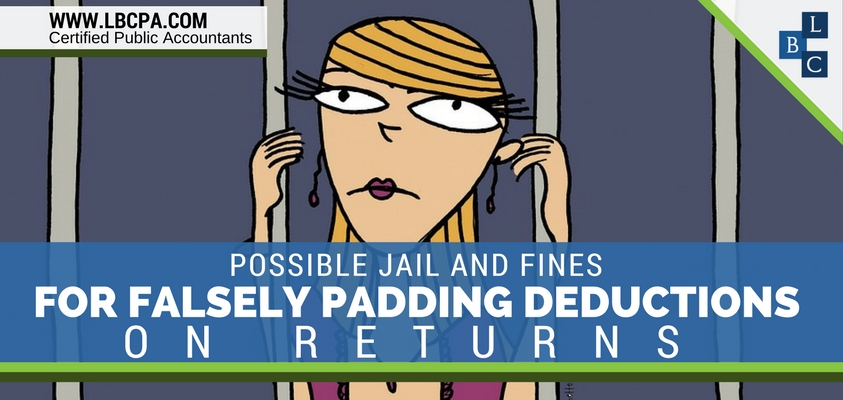LBCPA News 
Click here to go back
Possible Jail and Fines for Falsely Padding Deductions on Returns

The Internal Revenue Service warns against the temptation of falsely inflating deductions or expenses on tax returns to under pay what is owed and possibly receive larger refunds.
The vast majority of taxpayers file honest and accurate tax returns on time every year. However, each year some taxpayers fail to resist the temptation of fudging their information. That’s why falsely claiming deductions, expenses or credits on tax returns is on the “Dirty Dozen” tax scams list for the 2016 filing season.
"Taxpayers should file accurate returns to receive the refunds they are entitled to receive and shouldn't gamble with their taxes by padding their deductions," said IRS Commissioner John Koskinen.
Taxpayers should think twice before overstating deductions such as charitable contributions, padding their claimed business expenses or including credits that they are not entitled to receive – like the Earned Income Tax Credit or Child Tax Credit. Increasingly efficient automated systems generate most IRS audits. The IRS can normally audit returns filed within the last three years. Additional years can be added if substantial errors are identified or fraud is suspected.
Significant civil penalties may apply for taxpayers who file incorrect tax returns including:
-20 percent of the disallowed amount for filing an erroneous claim for a refund or credit.
-$5,000 if the IRS determines a taxpayer has filed a frivolous tax return.” A frivolous tax return is one that does not include enough information to figure the correct tax or that contains information clearly showing that the tax reported is substantially incorrect.
-In addition to the full amount of tax owed, a taxpayer could be assessed a penalty of 75 percent of the amount owed if the underpayment on the return resulted from tax fraud.
Taxpayers even may be subject to criminal prosecution (brought to trial) for actions such as:
-Tax evasion
-Willful failure to file a return, supply information, or pay any tax due Fraud and false statements Preparing and filing a fraudulent return, or Identity theft.
Criminal prosecution could lead to additional penalties and even prison time.
Taxpayers should remember that they are legally responsible for what is on their tax return even if it is prepared by someone else, so be wise when selecting a tax professional.
If you have any questions regarding accounting, domestic taxation, international taxation, IRS representation, U.S. tax implications of Real Estate transactions or financial statements, please give us a call at 305-274-5811.
Source: IRS






